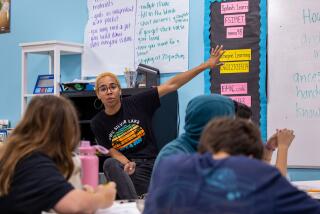Big Lessons in Small Space for ‘Shuttle’ Crew
- Share via
Three Fountain Valley sixth-graders, who withstood a fourth day of isolation in a 500-gallon drum despite record-breaking temperatures, are expected to emerge from their mock space shuttle Athena today, school officials said.
Ami DeVusser, 12, and Patricia Nelson and Kricket Green, both 11, entered the craft at 2 p.m. Friday.
The students at Northcutt Elementary School in Fountain Valley were part of a class project designed by teacher Ed Lamb to sharpen his students’ communication and problem-solving skills. “Each day seems to bring new problems and new solutions,” Lamb said. “We draw upon this to associate with real life.” He said the project teaches students to work as a group for a common
goal and prods them to come up with different ways to solve problems.
Lamb designed the project to let students observe the effects of isolation, but it has also been able to involve other educational disciplines, such as the mathematics needed to build the mock shuttle’s floor.
Tuesday’s record-breaking heat wave sent the students scurrying to solve the problem of nearly unbearable temperatures for the “on-board” crew inside the converted water tank.
“The fan’s not working,” came Patricia Nelson’s 10:40 a.m. distress call over a small classroom speaker. “It’s getting kind of hot in here.”
By noon, under Lamb’s supervision, students at the control station had come up with several solutions, including two fans at the entrance of the mock shuttle.
The crew was also advised to tear a curtain covering the on-board portable toilet into strips and soak them in water to make compresses. And about 2 hours later, students shaded the tank with a blue vinyl tarp attached to the school roof and to their teacher’s nearby truck.
Eight student groups--for communications, psychology, internal control, external control, food and water, security, exercise and sanitation--made the necessary provisions for the crew’s survival. Their tasks included developing exercise and nutrition programs, conducting tests and protecting the vessel from vandals.
The crew was equipped with lamps, a portable television, radio, cooking equipment, a refrigerator, food and a telephone.
“The phone only reaches us, so they can’t call mom,” explained 11-year-old Debi Prickett, 11, a member of the psychological team testing changes in the girls’ physical and mental responses with coordination games. Debi said she noticed that the girls seemed to talk slower and that their responses were slower than when they were tested before entering the capsule.
“It’s taking them longer to do the tests,” she said.
The students have been under 24-hour supervision by Lamb and parents, said principal Dwain Leach, who initially had reservations about the project until he saw Lamb’s plans.
“He had it well planned and he documented what he was going to do,” Leach said.
More to Read
Sign up for Essential California
The most important California stories and recommendations in your inbox every morning.
You may occasionally receive promotional content from the Los Angeles Times.













